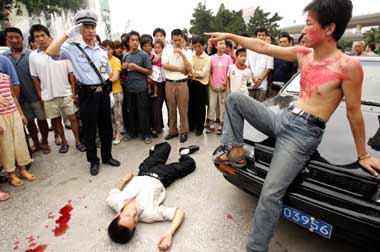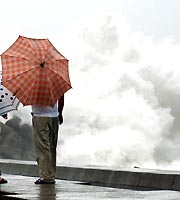|
Top diplomats to gauge broader Sino-US ties
(chinadaily.com.cn)
Updated: 2005-07-19 12:36 On one hand, China has been helping to lower the U.S. budget deficit by
buying their Treasury bills and China's cheap imported goods are welcome by many
American. On the other hand, the ever-expanding military buildup and global
reach has upset Defense Department and the CIA, who see these as most serious
potential threats to the U.S.'s security.
"You talk to the Pentagon and the Treasury about China, and it's like they
have two different countries in mind," said Pei Minxin, an expert on the
Sino-U.S. relationship at the Carnegie Endowment for International Peace in
Washington.
And consistency is always absent in the relationship.
"This administration must learn to send an unambiguous signal to China," he
said.
The Sino-US relationship has been changing over the years from "strategic
partner" during Clinton's administration to "strategic competitor" in Bush's
term. Bush later declared the relationship too complicated for a shorthand
label, a stance still being used by the administration.
Some official showed their positive stance toward China. Christopher Hill,
the assistant secretary of State for East Asian and Pacific affairs welcomed the
rise of a confident, peaceful and prosperous China while senior State Department
Asia specialist Evans J.R. Revere said the U.S had never set policy to restrict
or contain China.
Economically, the tension between the two is continuous. Bills restricting
China trade in the U.S. is still on going. A punitive 27.5 percent tariffs is
going to impose on Beijing if China does not immediately devaluate Chinese yuan,
claiming the existing trade as unfair. Last month, the China National Offshore
Oil Co.'s announced $18.5-billion takeover bid for California-based Unocal, an
act viewed as a threat to the United States' national security further
tightening the tensions between the two powers.
"There's too much hysterics and too little logic in the current debate,"
Representative Robert Wexler said. "The economic future of China is now tied to
that of the United States. In this context, both sides need to be mature and
prudent." Wexler believed that imposing punitive measure on China would hurt the
U.S. more than China. Many economists have already showed that imposing punitive
tariffs on China's imports would only push up the price of consumer goods in the
U.S. without bring any jobs back.
|
 | | | Typhoon Haitang affects Hangzhou | | |  | | | No drive under alcoholic influence | | |  | | | Typhoon Haitang comes | | |
|
 |
|
 |
|
|
Today's
Top News |
|
|
|
Top China
News |
 |
|
 |
|
|
|
|
|
|